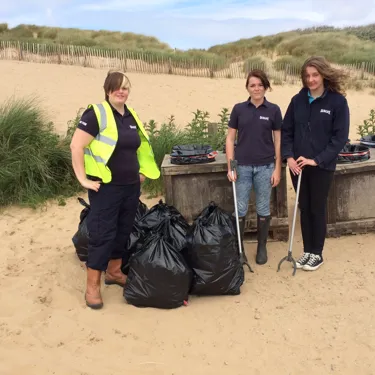Conservation Efforts
- Sunday 17th September 2017

SEA LIFE Weymouth, along with The SEA LIFE trust, are working relentlessly to conserve and protect our oceans and its marine creatures. Here’s how.
Our oceans are wonderful and beautiful, and we are always discovering new things about them. The ocean spans about 140 million square miles, covering nearly 71 per cent of the Earth's surface with 97 per cent of all the planet’s water being contained in the ocean.
According to Protect Planet Ocean, only 2.8% of the world’s ocean is protected. It’s important to look after our oceans and the many creatures which call them home, which is why our brand message is Breed, Rescue, Protect.
Our system of care and animal husbandry means that we can learn from and understand our marine friends, as well as protect endangered species.
With our partner charity, The SEA LIFE Trust, we help to support projects that focus on protecting marine wildlife and habitats all over the world. In fact, over £200,000 was raised globally in 2014 to help support the Trust’s many projects and partner organisations, and the figure is set to be at least £255k this year.
But just who are the SEA LIFE Trust? If you’re keen to find out about this excellent charity, then read on and discover all about the great work they do.
Reducing plastic litter
Did you know that an estimated 26 million tons of plastic pollution ends up in the ocean? The SEA LIFE Trust actively supports projects that aim to help reduce the amount of plastic entering our seas.
Plastic and rubbish pose a huge threat to marine life, so it’s vital we work together to find ways in which we can limit the litter in the ocean.
Even microplastics, small particles generally smaller than 1 mm can have a detrimental effect on the ocean. These particles can come from cosmetics and clothes, and can be ingested by marine life – causing big problems.
Turtle power!
None of the seven species of sea turtles, including the leatherback and green sea turtle, are free from danger. The charity will be focusing on raising awareness of the many problems these turtles face on a daily basis – such as drowning in nets targeting other species and the destruction of their habitats by tourism.
The trust has exciting plans to expand a scheme to keep sea turtles away from lethal fishing nets through LED lights. The initiative is currently being trialled off the coast of Peru and has already helped to reduce turtle mortalities by 60 per cent.
Fighting whaling and shark finning
The SEA LIFE trust is working closely with the Whale and Dolphin Conservation (WDC) to help fund anti-whaling work and to have ‘quotas’ implemented on the number of sharks caught by commercial fisheries.
The SEA LIFE Trust will be raising funds to help send experts to campaign to the Icelandic government and carry out DNA analysis of any suspected products.
Cyanide and the fish trade
The SEA LIFE Trust also sponsored a pioneering project to show whether tropical fish supplied to the ornamental trade had been caught using cyanide, a harmful chemical compound. If the test results come back positive, the supply line will be tracked back to the original source with the guilty fishermen potentially being blacklisted.
Combating overfishing
Over the last century, commercial fishing methods have had a drastic impact on the environment and have put many marine creatures at risk of becoming endangered. Some of the most commonly used fishing methods can actually destroy marine habitats, such as coral reefs and seagrass beds.
The SEA LIFE Trust is determined to help people make sustainable choices when buying seafood. Pick up your free copy of the Good Fish Guide next time you visit SEA LIFE Blackpool for more information on what you can do to ensure your next dish contains sustainably-sourced seafood.
Blue Parks and Priority Places
Just like we have National Parks on land, it’s important to look after our Blue Parks as well.
The Our Blue Backyard initiative aims to help create a healthier future by protecting our ocean, and the SEA LIFE Trust are one of the many partners to the campaign. The initiative has recently achieved great success, with the proposed expansion of the Papahānaumokuākea Marine National Monument in Hawaii being approved.
The SEA LIFE Trust has also partnered up with the Marine Conservation Society to help protect English seas. There are 34 'priority places' around the English coast that need urgent attention and protection.
Breed Rescue Protect
Here at SEA LIFE Weymouth, we have a number of different breeding programs and conservation campaigns that aim to educate people and protect marine life.
Over a quarter of all marine creatures call a coral reef their home, so it’s important to showcase the beauty and importance of coral reefs.
Throughout the world, SEA LIFE have a variety of different programs to help conserve endangered species, including the coral propagation program to help grow corals and place them into the ocean and the seahorse, shark and ray breeding programs.